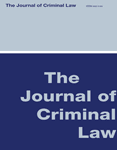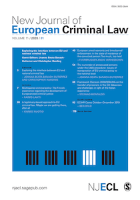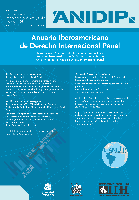
Revista Brasileira de Direito Processual Penal
Scope & Guideline
Elevating Perspectives on Procedural Justice
Introduction
Aims and Scopes
- Criminal Procedural Law:
The journal covers a wide range of topics within criminal procedural law, addressing both theoretical and practical issues that arise in the criminal justice system. - Impact of Technology on Criminal Proceedings:
There is a notable emphasis on the influence of technology, such as artificial intelligence and digital platforms, on criminal justice processes, including evidence collection and trial procedures. - Comparative Law Perspectives:
The journal frequently incorporates comparative analyses of criminal procedures from different jurisdictions, providing insights into how various legal systems address similar challenges. - Human Rights and Justice:
A core theme is the safeguarding of human rights within criminal procedures, including discussions on fair trial rights, the presumption of innocence, and the implications of procedural reforms. - Epistemic Justice and Evidence:
A unique contribution of the journal is its focus on epistemic justice, examining how knowledge and evidence are treated in criminal proceedings and the implications for marginalized groups.
Trending and Emerging
- Digitalization of Criminal Justice:
A significant trend is the exploration of digitalization in criminal justice, including remote trials and digital evidence, highlighting the need for legal frameworks to adapt to technological advancements. - Artificial Intelligence in Legal Processes:
The increasing integration of artificial intelligence in criminal procedures is a hot topic, with papers examining its implications for justice, evidence handling, and procedural fairness. - Epistemic Injustice and Victim Rights:
Emerging discussions on epistemic injustice focus on how marginalized voices are represented in criminal procedures, particularly regarding victims of crime and their rights. - Non-Prosecution Agreements and Plea Bargaining:
There is a growing interest in the use of non-prosecution agreements and plea bargaining, exploring their implications for justice, efficiency, and legal ethics. - Impact of Global Events on Criminal Procedure:
The journal is increasingly addressing how global events, such as the COVID-19 pandemic, have reshaped criminal procedures, prompting discussions about adaptability and resilience in legal systems.
Declining or Waning
- Traditional Criminal Trials:
There seems to be a decreasing focus on traditional criminal trial procedures, as the journal increasingly emphasizes technological advancements and alternative dispute resolution mechanisms. - Historical Perspectives:
Papers exploring the historical evolution of criminal procedure have become less frequent, suggesting a shift towards contemporary issues and practical applications of the law. - General Theoretical Discussions:
There is a noticeable reduction in broad theoretical discussions without direct application to current legal practices, with more emphasis now on practical implications of procedural reforms.
Similar Journals

Justicia
Exploring contemporary challenges in law and governance.Justicia, a distinguished academic journal published by UNIV SIMON BOLIVAR, serves as a vital platform for the dissemination of research within the fields of law, political science, and social justice. Since its transition to Open Access in 2014, it has broadened its reach, enabling scholars, practitioners, and students from around the globe to engage with high-quality research unrestricted by subscription barriers. Located in Barranquilla, Colombia, the journal aims to foster interdisciplinary dialogue and innovation by publishing original articles, reviews, and case studies that reflect contemporary legal challenges and social issues. With its commitment to elevating discussions on justice and governance, Justicia plays a crucial role in shaping legal scholarship and influences policy-making, making it an essential resource for anyone dedicated to understanding and contributing to the field.

QUEENS LAW JOURNAL
Exploring the Depths of Law and JusticeQUEENS LAW JOURNAL is a prestigious legal journal published by Queen's University, Faculty of Law, located in Kingston, Ontario, Canada. With its ISSN 0316-778X, the journal serves as a key platform for academic discourse and research in the field of law, encompassing various disciplines such as criminal law, constitutional law, and international law. Although currently not available as Open Access, the QUEENS LAW JOURNAL maintains a strong reputation for publishing impactful research, making it a vital resource for legal scholars, practitioners, and students alike. By fostering an environment for innovative legal theories and critical analyses, the journal plays an essential role in advancing legal scholarship and promoting informed discussions on pertinent legal issues. Emphasizing quality and rigor, the QUEENS LAW JOURNAL is a valuable addition to any academic library and serves as a trusted reference for those engaged in the legal profession.

Journal of Criminal Law
Fostering Scholarly Dialogue in Criminal LawWelcome to the Journal of Criminal Law, a prestigious publication in the field of legal studies, expertly published by SAGE Publications Ltd. With a rich history that dates back to 1937, this journal has been a vital platform for disseminating innovative research and critical analyses pertaining to criminal law and justice issues. The journal boasts a commendable Q2 ranking in the Law category for 2023, placing it among the top tier of legal publications. It is recognized for its impactful contributions, as indicated by its impressive Scopus Rank of #346 out of 1025 in the Social Sciences - Law category, positioning it within the 66th percentile. Although it does not currently offer open access options, researchers, professionals, and students will find a wealth of rigorously peer-reviewed articles that address contemporary challenges and developments in criminal law. Based in the United States, the journal is committed to fostering scholarly dialogue and advancing understanding in an ever-evolving legal landscape.

New Journal of European Criminal Law
Connecting academia and practice in European criminal law.New Journal of European Criminal Law is a prominent academic journal devoted to the expansive realm of criminal law within the European context. Published by SAGE Publications Inc, this journal is dedicated to fostering scholarly dialogue and disseminating cutting-edge research that informs both policy and practice in the field. With an impressive Q3 ranking in Law and a solid position within the 60th percentile among its peers in Scopus, it serves as a vital resource for academics, practitioners, and students alike. Although the journal operates under a traditional access model, it provides readers with insightful articles that cover contemporary issues, legal analyses, and case studies pertinent to European criminal law. Since its inception in 2009, the journal has continually pursued its objective of advancing understanding and improving legal frameworks by inviting contributions that challenge existing paradigms and propose innovative solutions. Join a community committed to excellence in research and practice, and explore the latest developments in European criminal law within the pages of this esteemed journal.

Revista Brasileira de Direito
Shaping the Future of Law Through Open Access ScholarshipRevista Brasileira de Direito is a prominent open-access journal dedicated to advancing the field of legal studies in Brazil and beyond. Published by FAC MERIDIONAL-IMED, this journal has been providing a platform for scholarly discussion and research dissemination since its transition to open access in 2013. With an ISSN of 1807-1228 and an E-ISSN of 2238-0604, the Revista Brasileira de Direito focuses on a wide-ranging scope that includes but is not limited to constitutional law, international law, civil rights, and legal theory. This journal is crucial for researchers, legal professionals, and students seeking to stay informed about contemporary legal debates, case studies, and innovative legal solutions. Based in Passo Fundo, Brazil, the journal aims to contribute significantly to the academic landscape by fostering a collaborative environment for the exchange of ideas and critical analyses within the legal community.

Anuario Iberoamericano de Derecho Internacional Penal
Connecting researchers and practitioners in criminal justice.Anuario Iberoamericano de Derecho Internacional Penal is a distinguished open-access journal dedicated to the field of international criminal law, published by UNIV ROSARIO, EDITORIAL. Since its inception in 2013, this journal has provided a platform for rigorous research and scholarly discussions related to the complexities of international penal law, enhancing understanding and application across Ibero-American jurisdictions. With an ISSN of 2346-3120, it caters to an audience of researchers, legal practitioners, and students who are keen to explore contemporary issues, case law, and reforms within the realm of international criminal justice. The journal aims to foster interdisciplinary dialogue, promote legal scholarship, and contribute to the development of international law principles in the Spanish-speaking world. As an essential resource for those engaged in the study and practice of international law, Anuario Iberoamericano de Derecho Internacional Penal continues to uphold a commitment to accessibility and academic excellence.

COLUMBIA JOURNAL OF LAW AND SOCIAL PROBLEMS
Analyzing the Impact of Law on Social DynamicsCOLUMBIA JOURNAL OF LAW AND SOCIAL PROBLEMS is a distinguished academic journal published by the COLUMBIA JOURNAL TRANSNATIONAL LAW ASSOCIATION, dedicated to the intersection of law and social issues. Established in 1973, this journal serves as a platform for the exploration and analysis of socio-legal problems in the contemporary context. With its robust scope encompassing areas such as social justice, legal reform, and public policy, the journal appeals to researchers, professionals, and students alike who are engaged in critical examinations of the legal systems and their societal impacts. Although it is not an open-access journal, it maintains academic rigor as reflected in its Q4 ranking across various categories including Law and Sociology, indicating its commitment to disseminating scholarly work that contributes to ongoing discussions in these fields. The journal’s address at Columbia University School of Law in New York situates it within one of the leading centers for legal scholarship, making it an essential resource for those seeking to deepen their understanding of law's role in addressing social problems.

University of Western Australia Law Review
Navigating the Complexities of Legal ThoughtThe University of Western Australia Law Review is a prestigious academic journal dedicated to the critical examination and exploration of legal issues in Australia and beyond. Published by the Law School of the University of Western Australia, this journal has become a significant resource for legal scholars, practitioners, and students alike, contributing to the rich discourse in the field of law. With an ISSN of 0042-0328 and a current categorization in the Q3 quartile in the field of Law as per the 2023 rankings, it stands among a cohort of respected legal publications. The journal, though not open access, facilitates a sharing of unique insights and research from 2019 to 2024, aiming to address emerging and traditional legal challenges within a global context. With a Scopus rank of #651 out of 1025 in Social Sciences Law, it holds a percentile of 36, reflecting its valuable contributions to legal scholarship. The University of Western Australia Law Review invites researchers, practitioners, and students to engage with its rich content and to contribute to the ongoing dialogue shaping the future of law.

Ciencia Juridica
Cultivating a Platform for Legal Excellence and DialogueCiencia Juridica is a distinguished academic journal published by UNIV GUANAJUATO, dedicated to advancing the field of legal studies. With its ISSN 2007-3577 and E-ISSN 2007-6142, this journal serves as a pivotal platform for scholars, researchers, and practitioners to disseminate innovative legal research and analysis. Although currently not an open-access journal, it ensures robust peer-reviewed content that maintains the highest academic standards. By focusing on a comprehensive range of legal topics, Ciencia Juridica aims to contribute significantly to the scholarly dialogue within the legal community, fostering critical thinking and innovative approaches to complex legal issues. The journal's commitment to enhancing legal scholarship makes it an essential resource for anyone engaged in the study or practice of law in Mexico and beyond.

Revista General de Derecho Penal
Fostering scholarly insights in criminal law.Revista General de Derecho Penal, published by IUSTEL, is a premier academic journal dedicated to the dynamic field of criminal law. With an ISSN of 1698-1189, this journal serves as a crucial platform for researchers, legal professionals, and students to share their insights and findings related to penal law and its evolving applications in contemporary society. Although it is not an open access journal, it maintains high scholarly standards, helping to advance discourse in legal studies. The journal's address is C PRINCESA NO 29, 2A DCHA, MADRID 28008, SPAIN, positioning it within a vibrant academic community. With a focus on current legal challenges and theoretical advancements, Revista General de Derecho Penal plays an essential role in fostering understanding and developing effective legal frameworks in criminal justice, making it an invaluable resource for those engaged in the study and practice of law.